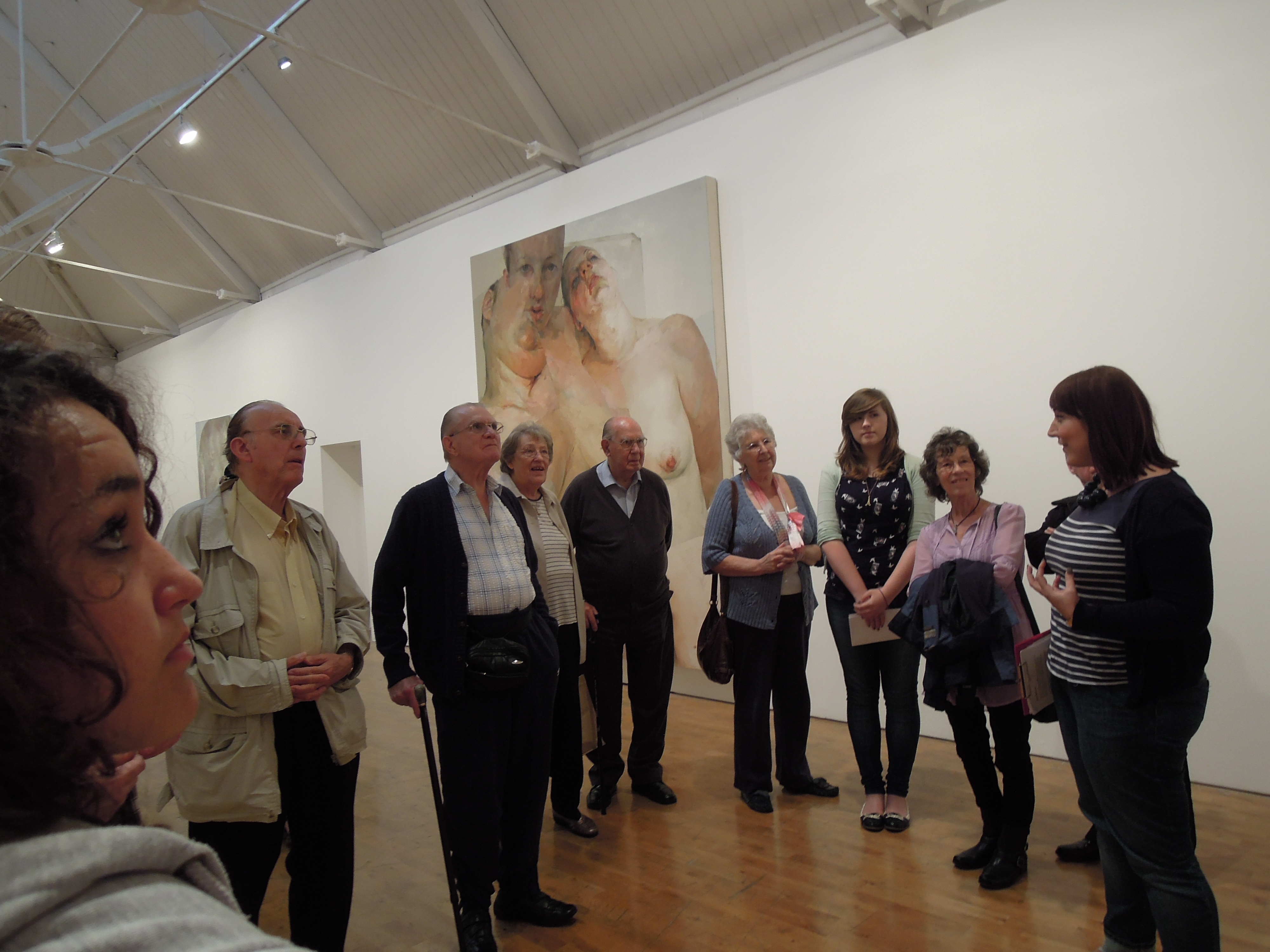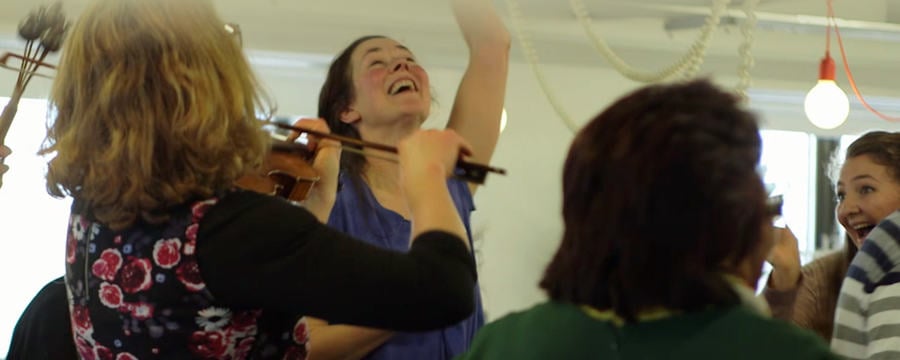How Culture Transforms Perceptions of Dementia

Share this step
By Maria Pasiecznik Parsons, Chief Executive, Creative Dementia Arts Network (CDAN)
Culture refers to a set of collective and shared behaviours, attitudes, beliefs, values, customs, language, and institutions of a particular group of people that influence how a person lives, behaves, and relates to others. Perception is the way in which an individual sees and understands the world, and their culture will strongly influence the way they do this.
Public perception of dementia remains largely negative: some 49% of people surveyed by the Alzheimer’s Society believed that a diagnosis of dementia meant they would be seen as mad and 62% felt that it meant ‘life is over’ 1.
The ideas of Tom Kitwood (1997) have been very influential in emphasising that the person comes first and that dementia is only one part of the person. His development of the concept of person centred care showed how a person’s wellbeing could be maintained through getting to know them as a unique individual and by making relationships that uphold their status as human beings.
The arts link naturally to person centred practice since they offer many opportunities for people with dementia to show that there is someone there challenging negative stereotypes and defying cultural perceptions as in the examples below:
-
Music shows all is not lost
Some of the strongest research evidence for the beneficial effects of participatory arts is found in music that triggers memory for familiar songs, enables people sing in tune, visibly relax, regain self-esteem and socialise. In the UK there are opportunities for people with dementia to join in music include: Live Music Now, A Choir in Every Care Home, Singing for the Brain (Alzheimer’s Society), Turtle Key Arts, and Music for Life. With a little practice, former musicians joined professionals in Bournemouth Symphony Orchestra.
-
Arts and muscle memories – on with the dance
Dancers and Movement Therapist Dr Richard Coaten (2001), a leading figure in dance and movement with people with dementia, describes how dance encourages spontaneity of expression in response to sensory, visual, auditory and kinaesthetic stimuli that aid memory recall. Meanwhile Ballet Rambert and Yorkshire Dance are amongst hundreds of established dance companies who have joined Green Candle Dance Company in offering older people’s dance classes.
-
Drama and wellbeing: co-designing and writing
In the USA Anne Basting took the story of Penelope into an assisted living community where all those living and working in the settings got involved in staging an epic play. Over many months the story was developed drawing on the ideas, imagination and memories of what it felt like to be waiting for a loved one to return, with roles and parts sometimes changing every day. No one failed, no one was penalised, and the empowerment was palpable. The Three Minute Festival at the West Yorkshire Theatre, already running dementia friendly productions, staged performances of plays written by people with dementia.
-
Intergenerational artistic connections
At the beginning of the Lost in Time and Space project none of the intergenerational group of people with dementia and marginalised young people had crossed the threshold of Modern Art Oxford – the city’s white cube – or engaged with modern art; but they related strongly to Kerry Tribe’s Dead Star Light exhibition and its themes of loss, identity, memory and confusion and spent a year working together to share visually sensitive, joyful, painful, humorous and tragic memories as they made a film about dementia5. Thus it was that in 2012, visitors to the Jenny Saville exhibition at Modern Art Oxford were surprised to find a group of older people and teenagers listening intently to a member of staff talking about the huge canvases depicting naked flesh….
-
Arts facilitates social connections: Meet Me
The original Meet Me programme still runs in MOMA in New York. In England, CDAN ran Meet Me at the Movies and worked with Entelechy Arts and The Albany in Deptford on developing a programme a Meet Me at the Albany programme. The question the programme sought to answer was “What if isolated and lonely older people had the opportunity to go to an arts centre instead of a day centre?” The continuity of the programme shows that, offered a choice, older people including those with dementia, would rather spend time pursuing meaningful artistic activities such as writing poetry as well as learning circus skills whilst sharing an inclusive open café space with other visitors to the Albany. Having connected with older volunteers and arts practitioners, many isolated older people also got along to other events.
-
The gallery of whatever takes our fancy
Arts encourages older people with dementia to take risks, use cues and clues and search for new ideas, break rules and discover unorthodox ways of relating to contemporary exhibits. On an ARTZ gallery visit in Boston, a group of residents settled themselves in front of a large black and while photograph of giant cacti in an exhibition of photographs of US national parks. In the photo, some of the huge cacti had flowered and there were pops of colour here and there. Soon I heard a soft humming – the Yellow Rose of Texas. It became louder and then someone else joined in singing. After a few minutes the whole group were singing very loudly in a gallery where serious photographers were also studying the exhibition and discussing techniques. The song ended but a resident had noticed a snake at the foot of the cacti and those wearing their scarves took to waving these about in acting out tales of close encounters. Three residents managed to tie theirs together and began to conga. There really was no end to their creative interpretation of the photograph.
-
Arts helps us to hear the voice of people with dementia
John Killick the poet has spent decades sitting alongside people with dementia and helping them to communicate in any way possible. We may struggle to understand the poems but there is no doubting the way in which ideas, feelings and emotions are expressed show that the person is still there6. In the absence of speech, people with dementia can be encouraged to communicate in many different ways; playing the cello to a person with dementia facing the end of her life Claire Garabadian noted imperceptible eye movements as she drew her bow back and forth.
-
Arts challenge stigma
Today tens of thousands of people with dementia and their carers are involved in projects and programmes led by professional arts practitioners in arts and community centres, in the NHS and social care or in arts venues including theatres, museums, galleries that are becoming dementia friendly6. This creativity is addressing stigma and helping to transform cultural perceptions of dementia.
Which arts do you think most successfully challenge cultural perceptions of dementia and why? Do you have any examples of how the arts can tell society a different and more positive story about dementia?
References
- Alzheimer’s Society – Dementia Statistics Hub
- Alzheimer’s Society – Turning Up Volume: Unheard Voices of People with Dementia
- Goffman, E. (1986). Stigma: Notes on the management of spoiled identity. NY: Touchstone.
- Higgs, P. & Gilleard, C. (2017). (eds) Dementia, Aging and the Social Mind. Wiley Blackwell.
- Dementia Lost in Time and Space, Modern Art Oxford
- Zeisel, J (2011) I’m Still Here: Creating a better life for a loved one living with Alzheimer’s, Piatkus, Little, Brown Book Group
- Dementia Friendly Arts Guide
Share this
Dementia and the Arts: Sharing Practice, Developing Understanding and Enhancing Lives

Dementia and the Arts: Sharing Practice, Developing Understanding and Enhancing Lives


Reach your personal and professional goals
Unlock access to hundreds of expert online courses and degrees from top universities and educators to gain accredited qualifications and professional CV-building certificates.
Join over 18 million learners to launch, switch or build upon your career, all at your own pace, across a wide range of topic areas.
Register to receive updates
-
Create an account to receive our newsletter, course recommendations and promotions.
Register for free







